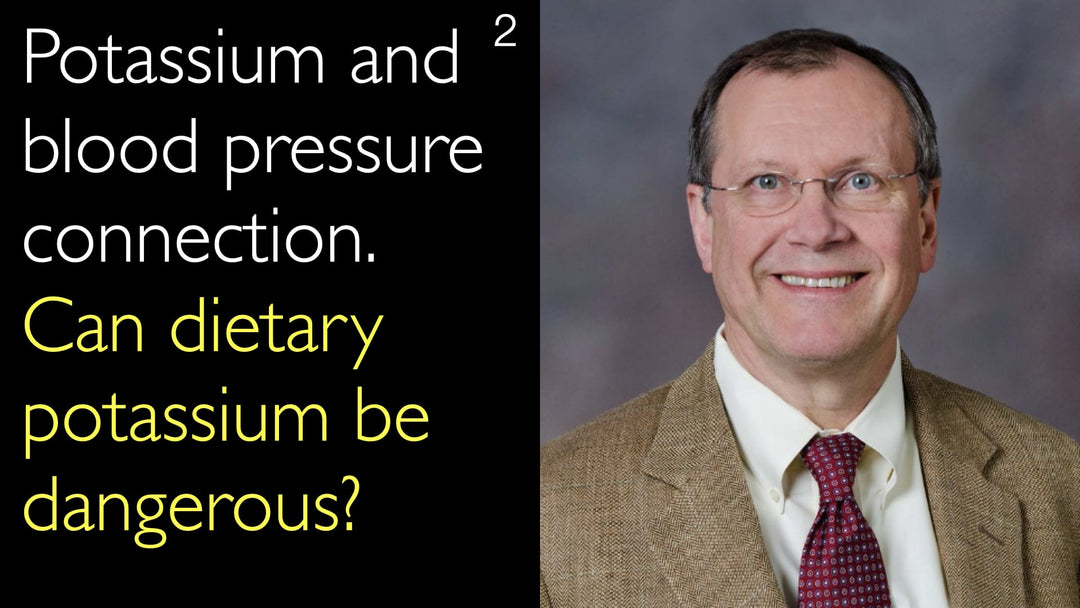Leading expert in nephrology and hypertension, Dr. David Ellison, MD, explains the critical connection between potassium and blood pressure. He clarifies that most people consume too little potassium and can safely increase intake through a diet rich in fruits and vegetables. Dr. Ellison details the significant benefits of potassium for cardiovascular health. He also outlines specific risk factors, like chronic kidney disease, that require careful potassium monitoring to avoid dangerous hyperkalemia.
Potassium for Blood Pressure Control: Benefits, Risks, and Dietary Sources
Jump To Section
- Potassium and Blood Pressure Connection
- High Potassium Foods and Diet
- Potassium Supplements and Salt Substitutes
- Hyperkalemia Risks and Safety
- Kidney Disease and Potassium Management
- Full Transcript
Potassium and Blood Pressure Connection
Dr. David Ellison, MD, emphasizes the vital role of potassium as a key micronutrient and electrolyte for cardiology. He describes the relationship between potassium and blood pressure as a "Goldilocks effect," where balance is essential. Having too much or too little potassium can be problematic, but the right amount varies by individual. For the vast majority of the population, increasing dietary potassium intake is a safe and effective strategy for supporting cardiovascular health and managing hypertension.
High Potassium Foods and Diet
Dr. David Ellison, MD, strongly advocates for obtaining potassium through a healthy diet. He recommends consuming more fruits and vegetables, which are naturally rich in this essential mineral. Citrus fruits and a wide variety of vegetables are particularly high in potassium. For a person with normal kidney function, it is nearly impossible to consume a dangerous amount of potassium through diet alone. The body's natural regulatory systems are highly effective at excreting excess potassium consumed from food sources.
Potassium Supplements and Salt Substitutes
While a healthy diet is the preferred method, Dr. David Ellison, MD, discusses alternative ways to increase potassium intake. He references a major study conducted in China that utilized a salt substitute. This substitute replaced some sodium chloride with potassium chloride. The intervention was highly effective at raising potassium levels from a very low baseline to a normal, healthy range. Dr. Ellison, MD, notes that the data suggests the micronutrient itself is what matters most, whether it comes from food or a fortified product like a salt substitute.
Hyperkalemia Risks and Safety
A primary concern with potassium is the development of hyperkalemia, or high blood potassium levels. Dr. David Ellison, MD, confirms that severely high potassium is dangerous and can cause cardiac arrhythmias and even death. However, he stresses that this condition is rare in healthy individuals. The risk is overwhelmingly concentrated in specific patient populations. The body's ability to excrete potassium is the key factor in maintaining a safe balance and preventing this serious electrolyte imbalance.
Kidney Disease and Potassium Management
Dr. Ellison identifies the main risk factors for developing hyperkalemia. The most significant risk factor is chronic kidney disease (CKD) or kidney failure, as impaired kidneys cannot effectively excrete potassium. Certain medications also increase risk, specifically drugs that block the renin-angiotensin-aldosterone system (RAAS), which is a common treatment for hypertension and heart failure. Dr. David Ellison, MD, advises that individuals with kidney disease or on these medications must be more cautious with their potassium consumption and work closely with their doctor to monitor levels.
Full Transcript
Dr. Anton Titov, MD: What foods are rich in potassium? And what about dietary supplements? There are potassium supplements.
Dr. David Ellison, MD: On the other hand, potassium is rather dangerous. Micronutrients and electrolytes, obviously for cardiology, are absolutely critical. This is why it's the Goldilocks effect: there's too much, too little, or just the right amount. Probably for different people, the right amount is different.
For the average person in this country, we consume too little potassium. I would say that's pretty clear. Most people should try and eat a diet that's higher in potassium. We always recommend fruits and vegetables, especially citrus fruits, and a variety of vegetables are very high in potassium.
For a normal person, it's really impossible to eat too much potassium. If you eat a lot of potassium, most people can excrete essentially all the potassium that they consume. So that's not a risk.
Certainly, in the study that was conducted in China, if you look at the baseline potassium intake, it was very low. Simply by changing from sodium chloride to potassium chloride in the salt substitute, they were able to get the potassium up. But it was really to a level that's just typical normal, not to a super high level.
I think most people in the world should try and consume more potassium. But one of the worries in that study is, what if someone developed high blood potassium? This is a common cause, as you mentioned, of cardiac problems. It can cause death if you get too high a potassium level in your blood, and that's certainly a worry.
As I said, most normal people can excrete normal amounts of a lot of potassium. It's people who have kidney failure, chronic kidney disease, who have difficulty excreting potassium. For those people, there's a lot more concern.
There have been smaller studies, taking people with chronic kidney disease and putting them on a "heart-healthy diet", which is high potassium and lowered sodium, to make sure that that's safe. In fact, it is, in most cases, safe.
But some patients who either have kidney failure or who take drugs that block the aldosterone system that I mentioned earlier, which allows us to excrete potassium, can have problems getting rid of potassium. Once in a while, high blood potassium levels develop. And that can be a real problem.
I think one has to be aware of the risk factors for high blood potassium, and those are overwhelmingly chronic kidney disease and drugs that block the renin-angiotensin-aldosterone system. If you either have one of those, the kidney disease, or you take one of the medications, you have to be a little bit more careful about potassium consumption.
You also asked about whether supplements can be effective, and I think most people advocate a healthy diet if at all possible. But in this trial in China, they did use a salt substitute, which is partly potassium chloride. And that worked very well.
The data suggests that the micronutrient potassium really is the important thing. How you get it is less important than that you get it.







